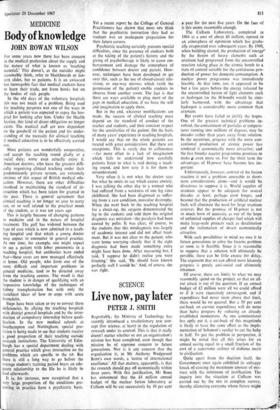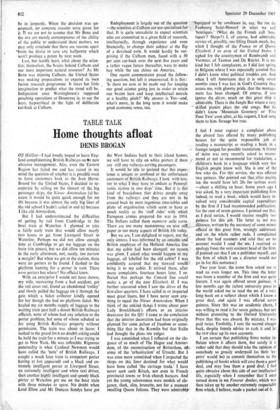Live now, pay later
SCIENCE
PETER J. SMITH Regrettably, the Ministry of Technology has recently introduced a revolutionary new con- cept (for science, at least) in the regulation of research under its control. This is that it really doesn't matter whether or not an organisation's mission has been completed, even though that Mission be of supreme concern to future generations. Nor is it any concern that the organisation is, in Mr Anthony Wedgwood Benn's own words, a 'centre of international excellence.' All that matters, apparently, is that the research should pay off economically within three years. With this justification, Mr Bean has announced that the £4 million annual budget of the nuclear fusion laboratory at Culham will be cut successively by 10 per cent a year for the next five years. On the face of it this seems reasonable enough.
The Culham Laboratory, completed in 1964 at a cost of about £6 million, opened in an atmosphere of optimism which has gradu- ally evaporated over subsequent years. By 1960, when building started, the production of energy* by the fission of heavy elements such as uranium had progressed from the uncontrolled
reaction taking place in the atomic bomb to a state of control suitable for the continuous pro- duction of power for domestic consumption. A
nuclear power programme was immediately
feasible. At that time, too, it appeared to be but a few years before the energy released by
the uncontrolled fusion of light elements such as hydrogen (in the H-bomb) would be simi- larly harnessed, with the advantage that hydrogen is considerably more common than uranium.
But events have failed to justify the hopes. One of the greatest technical problems in- volved, the containment of particles at tempera- tures running into millions of degrees, may be decades rather than years away from solution. In the meantime, progress with the more con- ventional production of atomic power has rendered it economically more attractive; and the fast breeder reactor programme promises to make* even more so. For the short term the advantages of H-power have become less im- portant.
Unfortunately, however, control of the fusion reaction is not a problem amenable to short- term considerations alone—and it would be disastrous to suppose it is. World supplies of uranium appear to be adequate for several decades at least, perhaps even longer, and beyond that the production of artificial nuclear fuels will eliminate the need for large uranium reserves. But the promise of H-power is not so much born of necessity as out of the hope of unlimited supplies of cheaper fuel which will make large-scale projects such as desalination and the reclamation of desert economically attractive.
With such possibilities in mind we owe it to future generations to solve the fusions problem as soon as is feasible. Since it is reasonable to suppose that a solution will ultimately be possible, there can be little excuse for delay.- The argument that we can afford more leisurely progress is purely anti-social and ultimately inhuman.
Of course, there are limits to what we may reasonably spend on the project, so that an all- out attack is out of the question. If an annual budget of £2 million were all we could afford or if it were excessively extravagant, and if expenditure had never risen above that limit, there would be no quarrel. But a 50 per cent cut-back on current expenditure will do more than halve progress by reducing an already established momentum. As one commentator has aptly put it, a cut-back of this magnitude is likely to have the same effect as the imple- mentation of Solomon's verdict to cut the baby in half. To put the problem in perspective, it might be noted that all this arises for an annual saving equal to a small fraction of the cost of a supersonic airliner of dubious merit to civilisation.
Quite apart from the decision itself, the Government once again exhibited its unhappy knack of causing the maximum amount of mis- trust with the minimum of justification. The inquiry into the situation at Culham was carried out by the AEA in complete secrecy, thereby alienating everyone whose future might
be in jeopardy.. When the decision was -an- nounced, no concrete reasons were given for it. If we are not to assume that Mr Benn and the AEA are merely contemptuous of the ability of the public to understand these matters, we may only conclude that there are reasons apart from the desire to save any halfpenny which won't produce a penny by next week.
Last, but hardly least, what about the scien- tists themselves, the brains behind Culham and our most important natural resource? As Mr Benn was injuring Culham, the United. States was making preparations to expand its 'own fusion research. programme. It takes but little imagination to predict what the trend will be. Indignation over Westinghouse's supposed poaching operations at Dounreay is, to say the least, hypocritical in "the light of deliberate cut-back at Culham. Redeployment is largely out of the question —the scientists at Culham are too specialised for that. It is quite unrealistic to expect scientists who are committed to a given field of research, intellectually, through experience and even financially, to change their subject at the flip of a devalued coin. It would hardly be sur- prising if the Culham men, faced with a 50 per cent cut-back over the next five years and a rather vague future thereafter, were to make hay while the sun shines on America.
One recent commentator posed the follow- ing question, but left it unanswered. It is this : 'Is there no case to be made out for keeping our good science going just in order to retain our brains here and keep intellectual morale at a healthy pitch?'' My answer is Yes—and, what's more, in the long term it would make good economic sense, too.











































 Previous page
Previous page